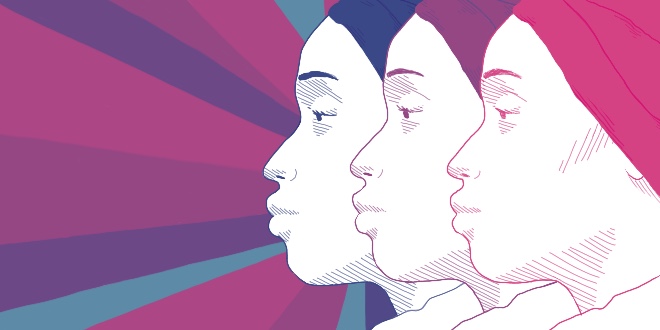The Triple Consciousness of ‘On Monday Last Week’ (2018)

Design by Lauren Frank
Akosua Adoma Owusu’s “On Monday of Last Week” (2018) is about a Nigerian woman’s experience as a nanny for an interracial couple’s child. As the description may suggest, the short-story-turned-film is a startling experience — fraught with racialized, sensualized banter amongst the characters. The couple is especially outrageous: a white man who instructs the protagonist to help raise his biracial child “as normal as possible” (he really means: as white as possible), and an African-American artist who co-opts and fetishizes the protagonist’s upbringing in Nigeria. The pair’s roving tongues and wandering eyes trap the protagonist between wanting to deride them and being embarrassed of herself. Between feeling important, and then forgettable. Choking with rage, yet also with desire…
This bold short film is one of director Akosua Adoma Owusu’s latest emotional triumphs, and the Fowler Museum got to host a special screening and discussion of Owusu’s work April 11 with the filmmaker herself. The screening was an insightful look into what Owusu defines the “triple consciousness of the African immigrant.” Owusu builds upon the widespread sociological term “double-consciousness,” the idea that African-Americans are continually split between choosing to progress their community or themselves in society. She complicates this by adding a further layer for Black immigrants, who are further split by the way they must rebuild their lives within a community that represents them and yet does not share the customs they’d grown up with. This triple-consciousness dilemma is brilliantly divided across the three main characters of “On Monday Last Week” (2018). As long as her green card is still being finalized, the film’s protagonist is overeducated and underutilized as a nanny, patronized by a white employer who can’t believe her English can be “so good,” and alienated by her African-American employer who’d visited Africa once and was “so enlightened” by the experiences they supposedly share. By the time the woman invites the protagonist to pose nude for her, it’s almost too raucous, too sarcastic, too literal an invasion to even feel like fiction — who could just dream up these indignities?
Owusu’s humor — because it bites so hard — cleaves right into the charged political aspects of these microaggressions committed, even by other Black people. As an African immigrant herself, Owusu is very aware of social class distinctions that ostracize her from both her Ghanaian and American communities. She grew up so much more privileged than many of her Ghanaian counterparts, which was what enabled her to travel to America for an education in the first place. And yet, she began with fewer career opportunities and connections than many Americans do, which heavily informs her self-described “working-class style filmmaking—” hoarding random archival footage and scrounging for whatever other cheap materials she could use to make films. Owusu’s cheeky and playful approach to her films paradoxically portray the serious identity crisis that dogs citizens of this increasingly globalized world. With such emotional material, some of her other works are not so easy to laugh at as “On Monday of Last Week” (2018).
Part of what makes “On Monday of Last Week” (2018) so sharp in its emotional intelligence is that it was originally a short story of the same name written by Chimamanda Ngozi Adichie, a resonant award-winning Nigerian author. “We’re all sort of wrestling with our identities and where we call home,” Owusu mused. “[Chimamanda] is a person of our time… a truly universal figure… who can speak to not just Nigerian or American culture but [expands her work] in various different languages.” It is this universality that Owusu hopes her filmmaking can and has captured. Coupled with her unique style, Owusu’s diverse portfolio demands to be explored. “I don’t think [anyone’s] identity is fixed,” Owusu declared. Her parting note to all the attendees was that she hoped through her films that anyone could feel similarly welcomed as Adichie welcomes her readers, to claim and “explore who [they truly] are—” as people of color, as women, as LGBT+, and as immigrants.




